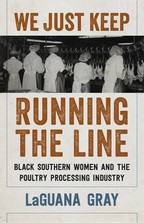
288 pages / 5.50 x 8.50 inches / no illustrations
African-American Studies | History / United States - Southern History | Social Studies / African-American History | Social Studies / Regional Studies | Women's Studies
LaGuana Gray is a historian who specializes in the study of African American women’s lives and labors. She is assistant professor in the Department of History and the Honors College at the University of Texas at San Antonio.
“In this compelling, if at times horrifying, examination of the evolution of the modern poultry processing industry, Gray (Univ. of Texas, San Antonio) provides a convincing account of what the intersectionality of race, class, and gender really looks like on the plant floor. . . . [A] fine contribution to US labor history. . . . Highly recommended.”—CHOICE
“Personal testimony and meticulous archival research showcase the power of voice in LaGuana Gray’s We Just Keep Running the Line.”—Times Higher Education
“A detailed, yet concise, history of the southern poultry industry and the dangerous, exploitative conditions inflicted on workers. . . . Its skillful exposition of how race, class, and gender oppression intersect adds to its versatility and potential value for courses on a range of subjects.”—Register of the Kentucky Historical Society
“In all, this book achieves its goal, and Gray gives voice to the black women employees of the poultry processing industry. This significant contribution to the dialogue of gender, race, class, and agriculture rehumanizes a marginalized and exploited population of the agriculture industry. In the conclusion, Gray writes humbly and hopefully that she ‘can give these women just a small bit of what they gave to [her]’ (161). She has, and this research can inspire more of the same.”—Rural Sociology
“As one of the few scholarly historical studies to date on this subject, We Just Keep Running the Line is most insightful for understanding the rise and success of the poultry industry in places like El Dorado, Arkansas, and across the American South. Through original sources like numerous oral and written interviews, a survey, and personal family experience, the author effectively captures the extent of the brutality that black women poultry workers faced, as well as their responses.”—Journal of Southern History
“A stellar examination of women’s working conditions inside an important American industry. . . . This impeccably researched book will introduce an eager audience to the testimonies of these women.”—Journal of American History
“Gray walks a fine line between placing the workers of El Dorado and Bernice in context and attending to the particularities of their lives. Much of the study will ring tragically familiar to readers who know about racially motivated economic discrimination in general and industrialized agriculture in particular. . . . Using one specific area at one particular time to raise larger questions is an honored way of writing history, and one hopes that the words of the women of Bernice, Louisiana, and El Dorado, Arkansas, will continue to find their way into studies of southern workers.”—American Historical Review
“An important study. . . . We Just Keep Running the Line is a powerful story about the rise of the poultry industry and the experience of black southern women who worked and lived in its shadow. A very readable account, it will be of interest to a wide range of scholars working on the U.S. South, labor, agro-industrial development, and race and gender.”—Arkansas Historical Quarterly
Found an Error? Tell us about it.